#include "lwip/opt.h"

Go to the source code of this file.
Macros | |
| #define | MEM_SIZE_F U16_F |
Typedefs | |
| typedef u16_t | mem_size_t |
Functions | |
| void | mem_init (void) |
| void * | mem_trim (void *mem, mem_size_t size) |
| void * | mem_malloc (mem_size_t size) |
| void * | mem_calloc (mem_size_t count, mem_size_t size) |
| void | mem_free (void *mem) |
Detailed Description
Heap API
Definition in file mem.h.
Macro Definition Documentation
◆ MEM_SIZE_F
Typedef Documentation
◆ mem_size_t
| typedef u16_t mem_size_t |
Function Documentation
◆ mem_calloc()
| void * mem_calloc | ( | mem_size_t | count, |
| mem_size_t | size | ||
| ) |
Contiguously allocates enough space for count objects that are size bytes of memory each and returns a pointer to the allocated memory.
The allocated memory is filled with bytes of value zero.
- Parameters
-
count number of objects to allocate size size of the objects to allocate
- Returns
- pointer to allocated memory / NULL pointer if there is an error
Definition at line 999 of file mem.c.
Referenced by bridgeif_fdb_init().
◆ mem_free()
Put a struct mem back on the heap
- Parameters
-
rmem is the data portion of a struct mem as returned by a previous call to mem_malloc()
Definition at line 617 of file mem.c.
◆ mem_init()
Zero the heap and initialize start, end and lowest-free
Definition at line 516 of file mem.c.
Referenced by lwip_init().
◆ mem_malloc()
| void * mem_malloc | ( | mem_size_t | size_in | ) |
Allocate a block of memory with a minimum of 'size' bytes.
- Parameters
-
size_in is the minimum size of the requested block in bytes.
- Returns
- pointer to allocated memory or NULL if no free memory was found.
Note that the returned value will always be aligned (as defined by MEM_ALIGNMENT).
Definition at line 831 of file mem.c.
Referenced by do_memp_malloc_pool(), malloc_keep_x(), mem_calloc(), pbuf_alloc(), slipif_init(), and START_TEST().
◆ mem_trim()
| void * mem_trim | ( | void * | rmem, |
| mem_size_t | new_size | ||
| ) |
Shrink memory returned by mem_malloc().
- Parameters
-
rmem pointer to memory allocated by mem_malloc the is to be shrunk new_size required size after shrinking (needs to be smaller than or equal to the previous size)
- Returns
- for compatibility reasons: is always == rmem, at the moment or NULL if newsize is > old size, in which case rmem is NOT touched or freed!
Definition at line 699 of file mem.c.
Referenced by pbuf_realloc(), and START_TEST().